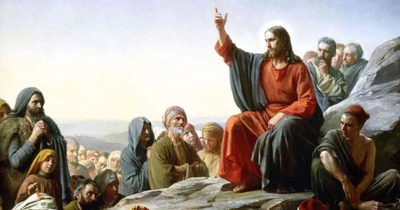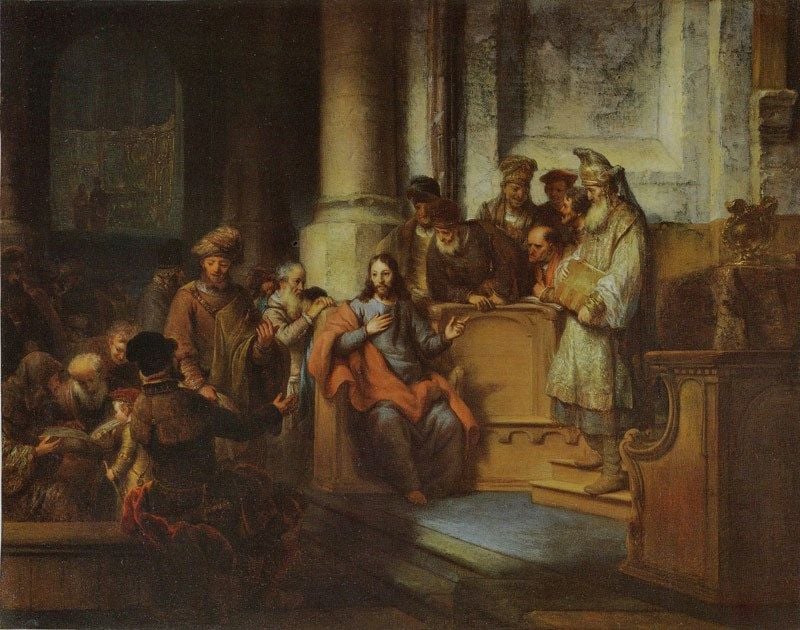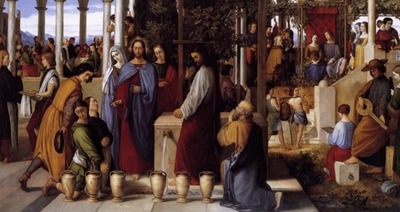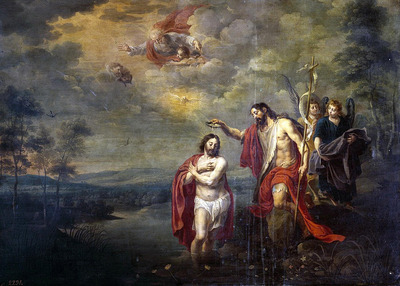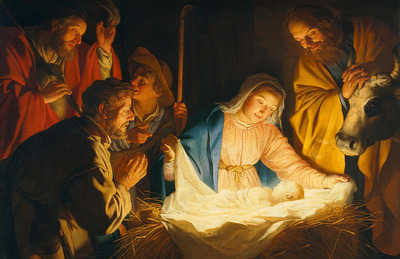December 25, 2024
|by N W
|
0 Comments
|
Christmas, Father Nixon, Hope, Humility, Joy
The Nativity of the Lord (Christmas)
December 25, 2024 — Year C
Readings: Is 9:1-6 / Ps 96 / Ti 2:11-14 / Lk 2:1-14
by Rev. Nixon Negparanon, Pastor
Many of us may be familiar with the song, “I Heard the Bells on Christmas Day.” It starts with, I heard the bells on Christmas Day, their old familiar carols play, and wild and sweet the words repeat, of peace on earth, good will to men. The song starts nicely, but on the third and following verses it continues:
Then from each black, accursed mouth
The cannon thundered in the South,
And with the sound the carols drowned
Of peace on earth, good will to men.
It was as if an earthquake rent
The hearthstones of a continent,
And made forlorn the households born
Of peace on earth, good will to men.
And in despair I bowed my head;
“There is no peace on earth,” I said,
“For hate is strong and mocks the song
Of peace on earth, good will to men.”
The stanzas suddenly seem to get dark and sad, and we can ask ourselves, what is this song all about? If we go to the origin of the song, we realize what actually is happening.
This song was written in 1863 by Henry Wadsworth Longfellow. He was a poet and a literary critic. Longfellow had faith to some degree but also had pain and suffering mark his life. His wife perished in a fire that he tried to extinguish, even with his own body. His eldest son was shot during the Civil War, and the youngest son also died at a young age.
Longfellow is a widower surrounded by tragedy: his son’s being killed in the Civil War and devastating things happening in that war, such as the pain, the number of lives that were being lost, and his own grief. Sitting in his home on December 25, 1863, he hears the bells of the local church ringing. He is inspired to write the poem, “I Heard the Bells on Christmas Day.” Longfellow’s experience had shown him that there wasn’t peace on earth. He knew that there was violence on earth, there was ugliness on earth. He writes about hearing the cannon thundering in the South and of how many houses are empty of their sons because of this Civil War. In this song, you see a man with a broken heart in a broken world on Christmas Day.
Perhaps many of us here today may have similar experiences. Some have lost a loved one, are away from families, have lost a job, have an illness of some sort. We all live in a broken world where wars are still present in some parts of the world, poverty and corruption still exist. It seems that, just like the song, “hate is strong, and mocks the song of peace on earth, good will to men.”
Then, however, Longfellow in his last stanza says,
Then pealed the bells more loud and deep:
“God is not dead, nor doth He sleep;
The wrong shall fail, the right prevail,
With peace on earth, good will to men.”
This is actually the message of Christianity. The message of Christmas is that even though this world is broken, even though this world is full of suffering and pain, hate and evil, God is not dead, and He does not sleep. God the Divine Word leaped like a warrior to this earth, and He allowed the brokenness and the hate and the evil and death to overwhelm Him so as to conquer the evil and the hate and the violence and the death. He transformed it so that you and I, in the midst of a world that is broken, in the midst of the world where bells still ring even though cannons still boom, can still have hope. We can still ring those bells in the midst of wars. We can still ring those bells in the midst of grief. We can still ring those bells when we have been broken. We know that this is the true meaning of Christmas.
Today, the world pauses and holds its breath, for we gather to celebrate the birth of our Savior, Jesus Christ. The gospel passage we just heard from Luke tells the most extraordinary story in the simplest of terms. In the humblest of settings, amidst the quiet fields of Bethlehem, God enters our world not as a mighty king, but as a vulnerable child. It is a story of hope, humility, and uncontainable joy. In the silence of the manger, we see the love of God unveiled in its purest form.
The narrative begins with the decree from Caesar Augustus, a reminder of the vast power of the Roman Empire. Yet amid the show of worldly authority, God chooses to reveal His divine power in the stillness of a manger. Joseph and Mary, obedient to the call of God, travel to Bethlehem, fulfilling the prophecy that the Messiah would be born in the city of David. Consider the mystery of this moment. The King of Kings is born, not in a palace, but in a stable. His crib is a manger. His first visitors are shepherds, simple marginalized people of the time. Through this humility, God shows us His heart. He comes not to overwhelm us with grandeur, but to draw close to us in our everyday lives, in our struggles and simplicity.
When the angel appeared to the shepherds, they were terrified. But the angel’s message was clear: “Do not be afraid, for behold, I proclaim to you good news of great joy that will be for all the people.” These words echo across the ages to us today. The birth of Christ is not just a moment in history. It is a message of salvation, a promise that God is with us: Emmanuel.
Notice also the role of the shepherds. They are the first to hear and to respond. They go in haste to find the child and share the good news. In doing so, they become the first evangelists of the Gospel. This reminds us that God often chooses the humble and the unexpected to be His messengers. Perhaps this Christmas, He is calling us to share His love and joy with those around us. The shepherds, the first witnesses of this miracle, were not the powerful or the elite. They were ordinary people, just like many of us. Yet they were chosen to hear the angelic proclamation, “Glory to God in the highest and on earth peace, good will toward men.” This message reminds us that God’s love is for everyone, regardless of status or circumstance.
The heavenly host proclaims, “Glory to God in the highest and on earth peace to those on whom His favor rests.” This peace is not merely the absence of conflict, but the profound peace that comes from being reconciled with God. It is the peace that heals broken hearts, restores relationships, and offers hope in times of darkness.
This message of peace and Longfellow’s poem resonate profoundly during this Jubilee Year of Hope. Pope Francis has declared a Jubilee Year of Hope in 2025. In the Pope’s Bull of Indiction, he said, “During the Holy Year, we are called to be tangible signs of hope for those of our brothers and sisters who experience hardships of any kind.”
That hope is born of love and based on the love springing from the purest heart of Jesus upon the cross. “For if, while we were enemies, we were reconciled to God through the death of his Son, much more surely, having been reconciled, will we be saved by His life.” (Romans 5:10) That life becomes manifest in our own life of faith, which begins with baptism, develops in openness to God’s grace, and is enlivened by a hope constantly renewed and confirmed by the working of the Holy Spirit.
As we reflect on the birth of Christ, we are reminded that hope is not an abstract idea, but a person, Jesus Christ. The Jubilee Year calls us to renew our trust in God’s promises and to be beacons of hope in a world that often feels weighed down by despair. The light of Bethlehem that shines in the darkness is the same light that we are invited to carry in our lives and communities, illuminating the path toward reconciliation, justice, and joy.
Today, as we gaze upon the Nativity scene, let us open our hearts to the mystery of God’s love. The birth of Jesus is an invitation to encounter God in the ordinary, to embrace humility, and to share His joy with the world. Let us also embrace the call of this Jubilee Year of Hope. This year is an opportunity to live out the message of Christmas in tangible ways by reaching out to those in need, by fostering unity in our families and communities, and by trusting in the transformative power of God’s grace.
Let us remember that the miracle of Christmas is not just that God came to dwell among us, but that He continues to dwell within us. Every Eucharist we celebrate is a reminder of this truth. Christ is Emmanuel, God with us. May this Christmas also remind us that God is not dead, nor does He sleep. Even in the midst of grief, we worship Him. In the midst of grief, we pray. In the midst of grief, we love each other. In the midst of grief, we ring those bells, because we know the truth is that God has become one of us. He’s not dead. He does not sleep. He’s near, and He loves you and me.
As Christians, we are called to radiate the light of Christ, especially during this joyous season. We are tasked to share the spirit of Christmas with our brothers and sisters and our community. Let us be witnesses of joy. Joy is the hallmark of Christmas. Let us be beacons of hope and positivity, reflecting joy of the incarnation in our words and actions. Let us also reach out to those who may feel lonely and forgotten. A simple invitation, a warm meal, or heartfelt conversation can embody the love of Christ. Also let us not forget to serve the needy. The birth of Jesus in a manger reminds us of God’s special love for the poor and marginalized. Let us be generous in sharing our resources with those in need. Most importantly, let us live the Gospel. Our faith becomes a powerful testimony when we live it authentically. Let our lives inspire others to seek the peace and love that only Christ can give.
Our Church reminds us today that Christmas is not merely a day, but a way of life. It is an invitation to enter into the mystery of God’s love and to share that love with the world. Let us carry the spirit of Christmas beyond this day, making every moment an opportunity to glorify God and bring His peace to others.
As we leave this holy place today, may the joy of the shepherds, the faith of Mary and Joseph, and the peace of Christ fill your hearts. Let us go forth, as they did, glorifying and praising God for all we have seen and heard. Let the hope of this Jubilee Year inspire us to be agents of God’s love and mercy. May the light of Christ shine through us, so that the world may know the hope born in Bethlehem. Glory to God in the highest and on earth peace to all.
KEEP READING
 540-586-8988
540-586-8988 



